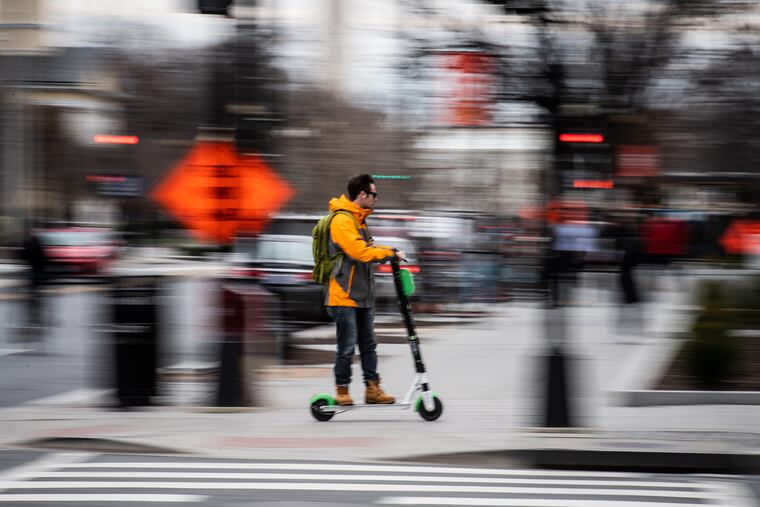Legalize e-scooters to expand transportation in Pennsylvania | Opinion
Our bipartisan bill to legalize e-scooter use is a common sense path toward cheaper, environmentally friendly transit.

When Henry Ford began his automobile business with the goal of mass-producing his black Model T, people scoffed at his vision of making “a car for the great multitude.”
Such skeptics likely never would have imagined that, according to Worldometers, it is estimated that more than 1 billion passenger cars travel the streets and roads of the world today.
Ride-sharing services such as Lyft and Uber, the latter of which 90 percent of Pennsylvanians have had access to since 2016, have reduced the need to own a car. Uber and Lyft also now rent electric bikes and scooters through their apps. Non-electric bike sharing has become another popular service.
After reporting success stories of their e-scooter vehicles bringing an affordable transportation alternative to those in underprivileged areas, these alternative ride-sharing companies are looking to expand to other states, including Pennsylvania.
On March 26, we participated in a demonstration of Lime and Bird scooters where we were able to ride the electric bikes on the street outside the Pennsylvania Capitol. After multiple meetings with these companies, we have come to believe e-scooters could bring a wealth of benefits to Pennsylvanians, including convenience, decreased road congestion and pollution, and cheaper transportation.
You rent an e-scooter the same way you order an Uber or Lyft ride, although scooter rides are cheaper. These convenient bikes are ideal for college students, tourists, and commuters who have shorter distances to travel. Trips which may be more of a hassle by car, or too long to walk, can be taken by e-scooter. This is not only convenient for the e-scooter traveler, but also for people in cars who now deal with less-congested roads.
Under current law, e-scooters are illegal in Pennsylvania. According to the state Department of Transportation, Pennsylvania currently outlaws the use of electric scooters on roads and sidewalks. Amending the state vehicle code would allow electric scooters to travel as bicycles do now. We are sponsoring a bipartisan bill, H.B. 631, which would add them to the state vehicle code and legalize them.
Due to current restrictions, the Commonwealth is already falling behind in transportation innovation in comparison to our neighbors in the Northeast, such as Maryland and Washington.
A D.C. Department of Transportation study found that Bird’s e-scooter pilot program in Washington “provides greater micro-mobility accessibility across the entire city."
City regulators in areas where private e-scooter companies are launching programs have been generally hostile, with some, such as Nashville, San Francisco, and Washington, imposing speed restrictions and fines and mandating certain zones within the cities where the vehicles can be used.
Cities in Pennsylvania may want to impose similar restrictions. However, we believe citizens are better off having the option available to them and the freedom to choose what mode of transportation they wish to use, especially for shorter trips. We also would urge city administrators in Pennsylvania to look to other cities as examples of how overregulation can get out of control and cause over-criminalization and limit access in underserved areas. For example, the D.C. study on Bird’s pilot program found that it provided “greater micro-mobility” for Ward 8, “which is traditionally underserved.” Bird pointed to this information as evidence that over-regulating e-scooters “incentivizes e-scooter providers” to avoid “historically underserved areas.”
For those with safety concerns around e-scooters, consider the following: In a Washington Post report on the first recorded ride-share scooter death in D.C., it was also noted that there had been 25 other transportation fatalities in the same year, including nine pedestrians, five motorcyclists, three bicyclists, and seven motorists or car passengers.
Moreover, people are increasingly aware of the high financial and environmental costs of cars, especially the millennial generation.
Car pollution is a major cause of global warming, with cars and trucks contributing nearly 20 percent of the United States’ total global warming pollution. Cars contribute to air pollution, emitting ozone, particle pollution, and air toxics. These pollutants affect millions of people, especially those living close to busy roads. The environmental impacts can be seen as haze, smog and soot in many parts of the U.S., and the acidification of lakes and streams.
If we want to make our Commonwealth an attractive place for young people to live and work, we must ease restrictions on alternative forms of travel that are less impactful on the environment. Our bill is a common sense, bipartisan solution.
Most importantly, we want all Pennsylvanians to have the freedom to choose any mode of transportation that is most efficient for them. The government should not decide how you get to work or visit family and friends. Instead, it should be looking at ways to make it easier for you.
If you want access to these services in Pennsylvania, let your state representative and senator know that you support our bill. On April 18, we will participate in a hearing on our legislation that you can watch on Rep. Rothman’s website, at reprothman.com. Together, we can move our Commonwealth forward on transportation innovation and ride sharing.
Greg Rothman (R., Cumberland represents the 87th District, and Stephen Kinsey (D., Philadelphia) represents the 201st District, in the Pennsylvania House of Representatives.